Who Do I Need to Notify and When?
When a death occurs, the family is usually in the midst of an emotional crisis. The Funeral Director may act as an advisor on many of the immediate problems; he or she has the knowledge and experience to relieve a family of needless worry and care.
The Death Certificate
The Funeral Director files the Death Certificate with the county clerk and obtains the burial permit. Certified copies of the Death Certificate may be required as proof of death in settling claims. Additional copies may be obtained for a nominal charge.
Wills
IF THERE IS A WILL, the deceased is said to have died “Testate”…the executor must file the will with the Probate Court within the time prescribed by statute and proceed with probate and distribution of the estate. The services of an attorney are advisable.
IF THERE IS NO WILL, but there is property, the deceased is said to have died “Intestate”…an administrator is appointed by the Probate Court, and the estate is distributed according to the State Statute of Descent and Distribution.
IN EITHER CASE, an attorney should be consulted.
Table of Contents
Please Note: The following information was taken from our book Things to Remember: A Helpful guide for the family. The book contains helpful estate planning information to assist you following the funeral service. This information is not a substitute for the advice of an attorney. Also, the book provides basic information about the law, which may change from time to time and become outdated. We cannot and do not provide specific information for your exact situation, and we cannot decide whether our book’s suggestions are appropriate for you. Because we cannot decide which suggestions are best for your individual situation, you must use your own judgment and, to the extent you believe appropriate, the assistance of a lawyer.
U.S. Veterans
Military personnel or anyone who has been honorably discharged is entitled to veterans’ benefits.
The following Veterans’ Benefits should be checked:
- Death Pension to the widow and minor children
- Reimbursement of a part of the funeral expenses to the Funeral Director or the person who paid the bill
- Burial in National cemeteries
- Burial Flag and grave markers
- Some states may have additional benefits. Check the local Veterans office
Papers required for Veterans’ Benefits:
- Itemized receipted funeral bill
- Veterans’ discharge papers (DD-214)
- Certified copy of Death Certificate
- Marriage Certificate
- Birth Certificate of minor children
Veterans’ benefits information is available from a Funeral Director, from a Veterans office or forms may be obtained from the Veterans Administration, Washington, D.C. 21230 or online at https://explore.va.gov/memorial-benefits
Veterans’ life insurance claims should be made at the same office where other benefits are applied for.
Charity Trusts
A monetary gift, in many states, may be made to a charitable organization by opening an account for yourself in a Trust savings account. At your death, the money in the account passes to the named charity. Consult your banker or attorney.
Social Security
Social Security claims should be filed immediately at the nearest office, as benefits may not be honored unless filed within two years after death. They will explain the benefits and help with claim papers without charge. The following information will be required:
- Certified copy of the death certificate or “Statement of Death” form SSA-721
- Deceased’s past nine months employment record (IRS FORM W-2)
- Copy of Marriage Certificate (if married)
- Deceased’s Social Security card or number
- Birth Certificate of minor children (under 18)…and for children still in High School
- Information regarding children disabled prior to age 22
- Personal income tax returns if self-employed
- Proof of Age, if over 60 (Birth Certificate)
DO NOT DELAY applying even though you do not possess all the required papers…the local office may suggest other proofs which can be used.
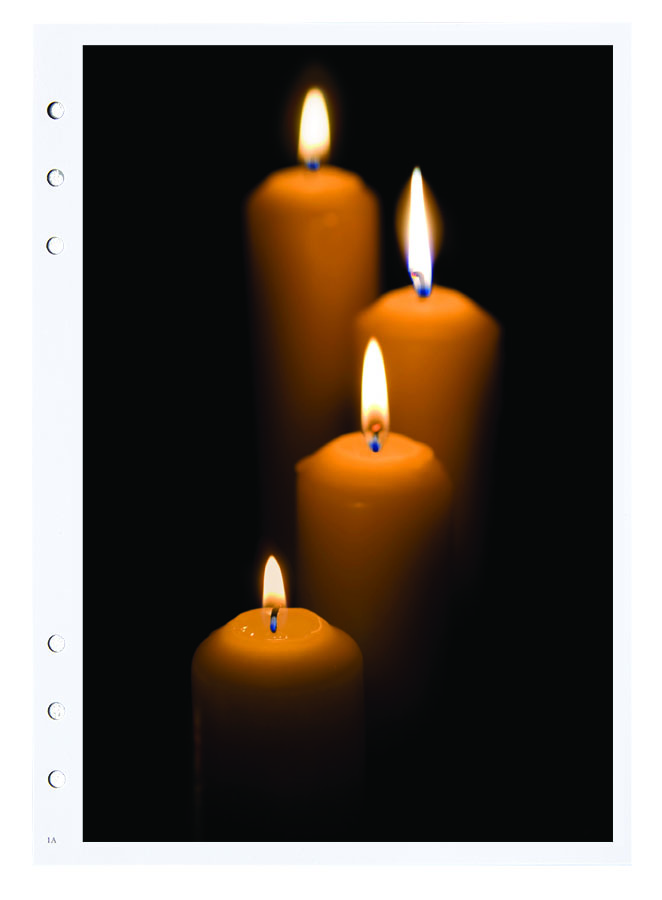
The following benefits should be discussed with the Social Security office:
- Lump-sum death payment to the surviving spouse, minor or disabled child(ren)
- Life pension to the widow(er) over 60 years old
- Pension to the widow(er) with dependent children under the age of 16 years old (dependent upon certain income requirements)
- Pension to minor children of deceased (under 18 years old)
If there is no widow(er) or children, the pension may be payable to the surviving dependent parent.
If a widow(er) 60 to 64 years old is receiving disability payments based on his/her own earnings, it may be possible to secure benefits based on his/her spouse’s earnings.
Ask about hospital and medical insurance plans and check on Medicare if you are 65 years or older.
Insurance
The local agents of all ensuring companies should be promptly notified, and they will provide claim forms. ALL policies (even those that have lapsed) should be examined, seeking any extended coverage. All policies on the lives of the survivors should be examined to determine changes in beneficiaries.
Stocks
Stocks in the deceased’s sole name require probate action. Stocks owned jointly may be transferred to the surviving owner by presentation of a certified copy of the Death Certificate to each company in which stock is jointly owned. Stock held as “Joint Tenants” transfers to the survivor upon proper documentation to the broker. Stock held as “Tenants in Common” requires probate. A broker or banker can assist you.
Federal and state tax questions are best answered by an attorney or tax advisor.
Real Estate
The services of an attorney are advisable in ALL real estate matters.
Real estate owned jointly by husband and wife is automatically transferred to the survivor, but a certified copy of the Death Certificate should be filed with county authorities in connection with the real estate deed.
Real estate owned solely by the deceased or as a tenant in common, or jointly with someone other than husband or wife, must be probated whether or not there is a will.
Federal and state estate and gift taxes should be thoroughly researched by an attorney.

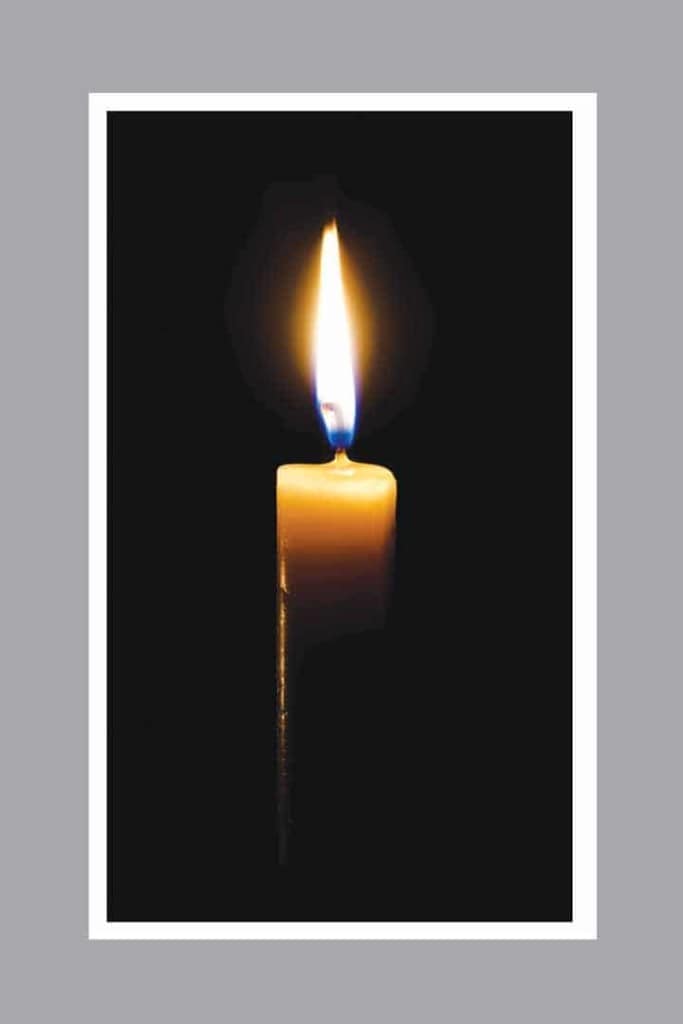
Individual Retirement Account
Under IRS regulations, an INDIVIDUAL RETIREMENT ACCOUNT (IRA) may be established through a Bank, Insurance Company, or Broker. At death, any amount in the account will be paid to the beneficiaries. Consult your attorney, insurance agent, banker, or broker.
Bank Accounts
Safe Deposit Box
Savings Bond
Single Ownership Bond is part of the estate and will be paid or re-issued to a qualified person.
Beneficiary (one owner, payable on death to a beneficiary). The bond becomes the property of the beneficiary. If a beneficiary dies first, no action required unless a new beneficiary or co-owner is added. Proof of death is required for redemption or re-issue.
Co-ownership (two names on bond). The survivor becomes the owner; a beneficiary or co-owner may be added.
An attorney or banker should be consulted.
Automobile Title
Estate and Gift Taxes


Protecting “Valuable Papers”
A safe deposit box is today’s best security bargain and should be the foundation of a family’s safekeeping plan.
A simple rule to determine what goes into the “box” is: if replacement will cost money, time, or trouble, keep the document in the “box”. This would include items such as marriage and divorce papers, naturalization papers, government-recorded documents, and auto titles.
A copy of the Will should be kept by the attorney and the original kept in the deposit box of your bank and at home. In some states, it may be better to keep the original with an attorney for quicker access. An attorney can answer this specific question. Stock certificates may be left with a broker or in a deposit box.
Documents to be kept at home are those that may be replaced such as all insurance policies, canceled checks, educational records, guarantees, appraisals, immunization records, tax returns, and a list of all credit cards and numbers.
IMPORTANT – Maintain a duplicate inventory of documents stored at home and in the “deposit box”.
Helpful Information
- Obtain the services of a competent attorney.
- Prepare written instructions indicating how financial affairs are to be handled.
- An up-to-date Will should be properly drawn.
- You can specify your beneficiaries and HOW they will receive your property…outright or in trust.
- You can select the person or organization as the executor to settle your estate.
- You can select a guardian of minor children.
- You can leave charitable bequests.
- Insurance and pension benefits should be made in a way to meet the needs of your family.
- Provisions should be made for the education expense of minor children.
View Our Products by Category
-

Urns
12 Products -

Service Records
69 Products -
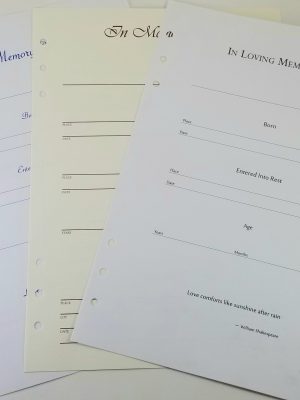
Register Book Pages-Packets
32 Products -

Prayer Cards
36 Products -
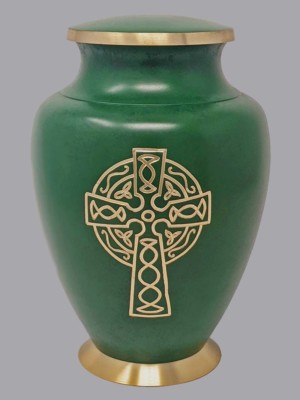
New Products
16 Products -

Memorial Pin with Card
5 Products -

Memorial Pin Only
5 Products -

Memorial Pendants
30 Products -
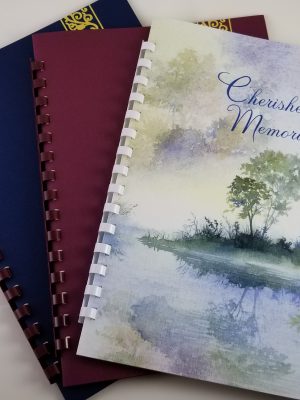
Leatherettes
17 Products -
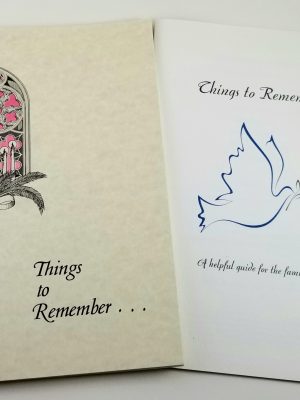
Food Books
2 Products -
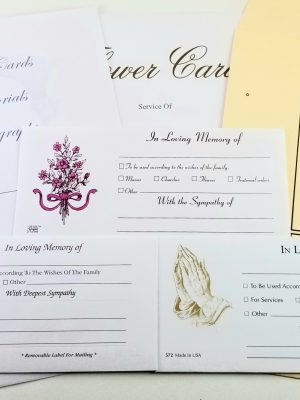
Envelopes
8 Products -
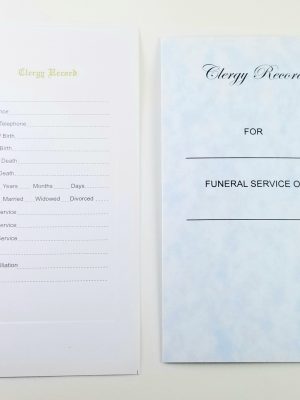
Clergy Record
2 Products -

Church Bulletins
4 Products -

Box Sets
66 Products -
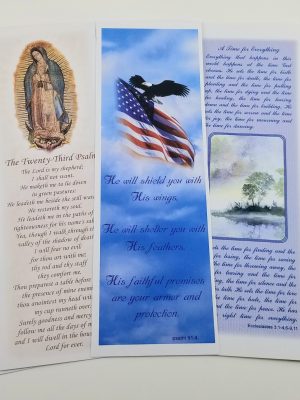
Bookmarks
55 Products -

Blank Stock
20 Products
